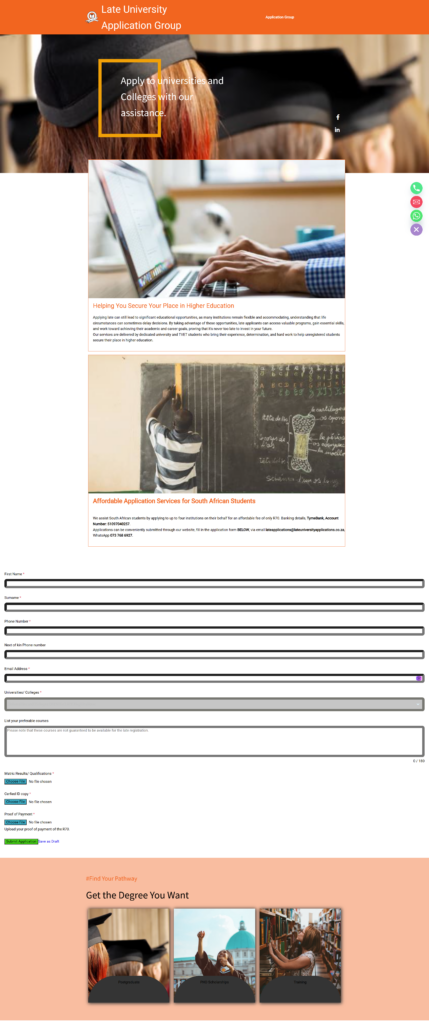As the university registration season heats up, scammers are once again preying on desperate students with false promises of late application assistance. This year’s culprit, operating as the “Late University Application Group” through lateuniversityapplications.co.za, is charging unsuspecting students R70 with promises to submit late applications to multiple institutions.
Sadly, this isn’t the first time we’ve encountered such a scam. Last year, a similar operation called “Masifunde Youth Development” deceived students in much the same way, leaving many victims out of pocket and frustrated.
What We Know About the Latest Scam
The “Late University Application Group” website promises to submit applications on behalf of students for up to four universities. They request R70 upfront, along with personal information, including certified ID copies and academic records. Their communication channels an email address ([email protected]) and a WhatsApp number (073 768 6927) add a veneer of legitimacy, making the scam appear credible to unsuspecting students.
Key Details From the Website’s WHOIS Data
A closer look at the website’s registration data reveals the following:
- Domain Name: lateuniversityapplications.co.za
- Registrant Organization: Infinity Group
- Domain Created: 20 January 2025
- Registrar: Domains.co.za
- Name Servers: ns1.tld-ns.net, ns2.tld-ns.com, ns3.tld-ns.net, ns4.tld-ns.com
While the domain is active and recently registered, the so-called “Infinity Group” listed as the registrant cannot be verified as a legitimate organization associated with South African universities.

Déjà Vu: Similar Scam Last Year
This scam eerily mirrors the “Masifunde Youth Development” operation that circulated last year. Masifunde Youth lured students through TikTok influencers and a website that promised guaranteed university placements in exchange for a R50 “admin fee.” Once students provided their details and paid, they never heard back. The website eventually went offline when the hosting provider suspended it for non-payment.
Both scams exhibit similar tactics:
- False promises of guaranteed admissions.
- Small fees to make the scam appear accessible and non-threatening.
- Requests for personal information, putting victims at risk of identity theft.
- Poorly designed websites with numerous spelling and grammar errors.
The parallels between last year’s scam and this year’s “Late University Application Group” suggest a recurring pattern targeting students at their most vulnerable moments.
Red Flags to Watch For
- Unrealistic Guarantees:
The website claims to assist with late applications, a promise that is rarely feasible due to universities' strict deadlines and capacity limits. - Upfront Payments:
Legitimate organizations rarely ask for upfront fees for application assistance. Most application fees are paid directly to the university. - Request for Personal Information:
Scammers ask for sensitive information, such as certified ID copies and academic records, which could be used for identity theft or sold to third parties. - Lack of Professionalism:
The website’s grammar errors, vague descriptions, and missing affiliations with universities are strong indicators of fraudulent activity.
Impact of These Scams
Last year’s victims shared stories of financial loss, emotional distress, and fear of having their personal information compromised. Many students relied on these fraudulent services out of desperation, believing they offered a second chance at securing university admission.
These scams prey on students’ fears and anxieties, leaving them feeling betrayed and disillusioned. Beyond the financial loss, victims face the risk of identity theft and other long-term consequences.
What Universities Are Saying
South African universities, including the University of Johannesburg (UJ), have issued repeated warnings about unauthorized third-party services offering late application assistance. For example, UJ provides a free official late enquiry system and has stated that no payments should be made to third-party entities.
Students are encouraged to consult their chosen universities’ official websites for accurate and up-to-date information about application processes.
How to Protect Yourself
Here’s how you can avoid falling victim to scams like the “Late University Application Group”:
- Verify Organizations:
Research any service claiming to assist with applications. If they’re not directly affiliated with a university, be cautious. - Use Official Channels:
Always submit applications through official university websites or contact their admissions offices directly. - Be Wary of Upfront Fees:
Legitimate application processes involve fees paid directly to the institution, not third parties. - Safeguard Personal Information:
Never share sensitive documents with unverified organizations or individuals. - Ask Questions:
Demand proof of legitimacy, such as registration details or official university partnerships. Scammers often cannot provide convincing answers.
The resurgence of scams like the “Late University Application Group” underscores the need for vigilance during the university application period. At UniApplyForMe, we are committed to ensuring students have access to trustworthy and accurate resources to guide them through the application process.
If you encounter a suspicious service, report it to the authorities or the university in question. Always remember: if an offer seems too good to be true, it probably is. Let’s work together to protect students and ensure their journey to higher education remains secure.
Stay informed, stay vigilant, and trust only official channels when navigating your educational journey.


